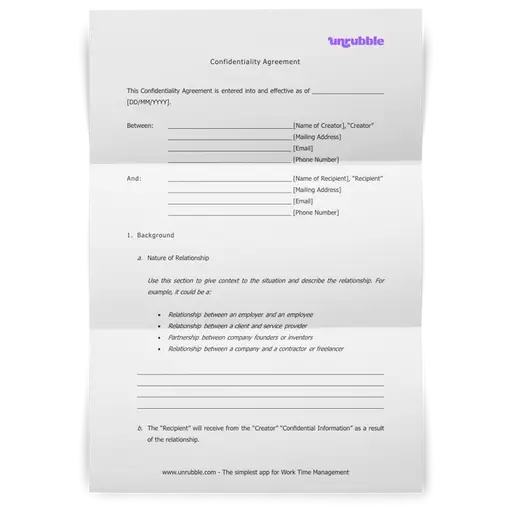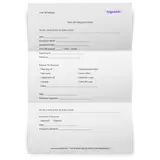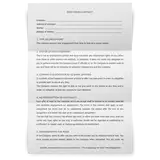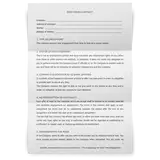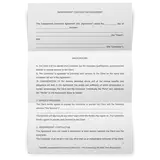If you have never crafted a confidentiality agreement template before, you may be feeling a bit intimidated. However, like other business agreements, confidentiality agreements can be as straightforward or as complicated as you want them to be, depending on your specific situation.
Here is a closer look at what a confidentiality agreement is, what types of business relationships require them, and best practices for executing a successful confidentiality agreement between two parties.
Here’s a sample Confidentiality Agreement template that can be easily customized and adapted to meet your requirements, so that you can keep your trade secrets safe and away from the public domain. It’s free to download and use.
What is a confidentiality agreement template?
A confidentiality agreement is a formal agreement made between two parties where the ‘receiving’ party agrees to keep certain information about an organization or individual confidential.
Information deemed to be confidential can be anything that the initiating party wants it to be, and that information is typically clearly outlined in the agreement. This could include any information or data related to clients, industry secrets, business processes, product development insights, financial records, or anything else that the creator of the agreement wants to remain confidential.
This agreement establishes a mutual foundation of trust between the two parties, and it also gives the initiating party a sense of security that their business or personal information will not be leaked to the public.
It's important to note that a confidentiality agreement is not the same as a non-disclosure agreement.
What types of business relationships require a confidentiality agreement template?
Anyone can create a confidentiality agreement for any reason, however, there are a handful of common scenarios where a confidential agreement is almost always required as a binding contract that protects two or more parties and prevents legal action.
Employer and employee
One of the most common reasons to need an employee confidentiality agreement template is for the employer/employee relationship. Employees are often privy to confidential information related to clients or customers, and they must keep this information private as a courtesy to both their employers and to the clients.
The employee should know what is private and what is considered public knowledge, and whether sharing some type of tangible materials can lead to disciplinary action.
For example, if you want to hire an SEO specialist to get help with search engine optimization, a mutual non-disclosure agreement can help solidify the relationship with a good agreement for transaction between the two parties.
The partnership between company founders or inventors
This is another scenario where a confidentiality agreement template for free may come in handy. When two founders or inventors get together to start a company or launch a product, both parties will want to protect their interests if things go sour. To avoid potential lawsuits, both parties need to clearly define what information should be kept confidential both during and after the relationship has ended. Even the basic confidentiality agreement form includes these details.
Company and contractor or freelancer
When a company hires an external contractor or freelancer, they will not have to sign an employment confidentiality agreement template.
However, companies can still protect their interests by having these individuals or agencies agree to a confidentiality agreement. In this scenario, it is best for the company to have an idea of what information they want to keep private, for how long, and what the consequences are if the contract is breached, i.e. the legal action that may take place.
If you want to protect your business operations, it is smart to involve a law firm that can help you craft confidentiality clauses and another variety of clauses that you may not think of.
Best practices for using your confidentiality agreement template
Downloading and filling out a simple confidentiality agreement template word is the easy part. However, negotiating the agreement and making sure that both parties understand it can be difficult! Here are some best practices for making sure that you get the most out of your confidentiality agreement template:
- Clearly define what you consider to be “confidential” – this may seem simple, but more often than not the receiving party discloses confidential information without even knowing that it is confidential! Make things easy for them by clearly outline what exactly you consider to be confidential so that there can be no confusion. Elaborate on what trade secrets are and what is considered confidential information, especially if you're working with a government official.
- Give recipients time to understand the agreement – Confidentiality agreements can be awkward and in some cases, the receiving party may be offended that you do not take them at their word. If you are initiating a contract, be respectful of this and give them time to read and understand the agreement, while also outlining the benefits of the agreement for both parties. Explain what makes the agreement invalid, what the non-circumvention clauses are and all the things that you may consider common knowledge, but may result in a breach of contract because the prospective buyer does not understand them. Most importantly, explain what "confidential information" really means.
- Update your template as your business changes – The business environment can change so fast, so always remember to update your template as your needs change. Definitions for things like “data” and “intellectual property” are ever-evolving and it’s important to remain flexible and vigilant in protecting your confidential information. For example, there are things that could be considered trade secrets, but over time, they become public knowledge because the subject matter goes into public domain.
